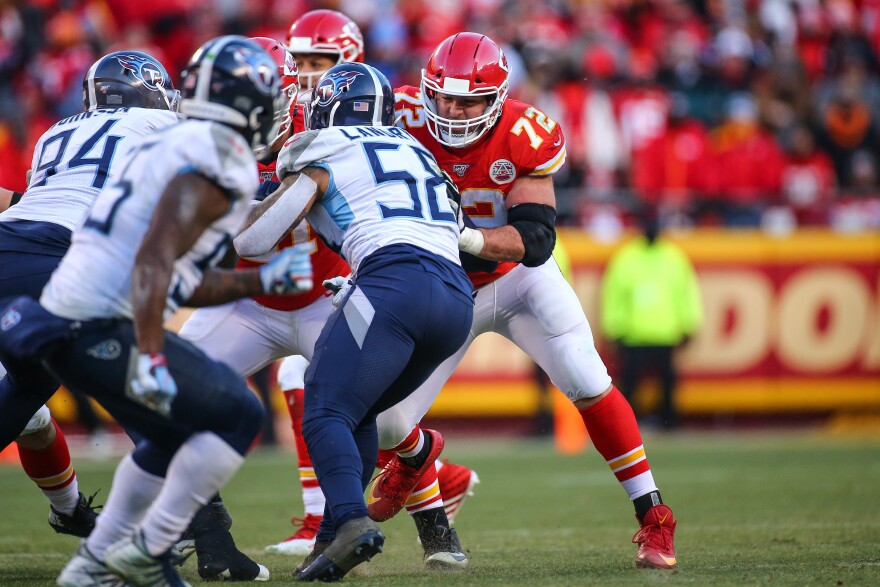If you placed a Super Bowl wager in Missouri or Kansas this year, chances are good it was probably illegal.
But in Missouri, the smart money is increasingly on legal sports betting. That might become a reality by the end of the year, thanks to a 2018 Supreme Court case that gave states the right to organize sports betting.
"We know that there's currently six bills (in Missouri) that are out there relating to sports betting," said Tim McGrail, deputy director of the Missouri Gaming Commission, which is the state agency that oversees licensed gambling.
"This is the second year that legislation has been submitted," McGrail said. "From what we've seen on the proposed legislation, it is being introduced by both of the parties on it, so I would think that there would be some interest on both sides."
Kansas lawmakers also have considered legalizing sports betting. The legislature took up several bills on the issue during last year's session but failed to pass anything; they are trying again this year.
Meanwhile, in Missouri's neighbor to the north, more than $6.5 million was wagered on the Super Bowl at 18 casino sports books, both in person and on mobile, said Wes Ehrecke, president and CEO of the Iowa Gaming Association, a nonprofit that advocates for commercial gaming in that state.
Iowa has pulled in $1.4 million in additional tax revenue since August, when it opened up for sports betting, Ehrecke said.
As lawmakers in both state mull and massage language in their bills, Ehrecke offered several pieces of advice based on Iowa's experience.
1. Get the tax rate right.
Since Las Vegas became "Vegas," the tax rate on sports betting there has been at 6.75%, said Ehrecke.
"We really try to use that model, to be competitive against the illegal sports operations on the internet," he said.
Federal and other taxes and fees would also be imposed.
That means states, the federal government and casino operators average about 10% of the take, so someone who placed a $100 bet on the Chiefs in the Super Bowl would have netted about $90 in winnings, Ehrecke said, before adding his congratulations to the Chiefs.

2. Keep your licensing fees low.
This is a small-margin business, according Ehrecke. "You start adding on these various fees and taxes, then it just doesn't become competitive."
One fee to watch out for is called a royalty fee or integrity fee, which would go to sports governing bodies like the NFL, MLB or NCAA.
McGrail said some of the bills being considered in Missouri's General Assembly include them.
3. You've got to go mobile.
Bettors increasingly want a way to place bets without physically going to a casino.
In Iowa, registered mobile users can place a bet from anywhere in the state except a 60-yard buffer around the border.
"It's called geo-fencing," said Ehrecke, and it has created a lot of interest. "There's great technology to do that online."
4. Crawl before you walk.
Before people put their hard-earned cash on the line, they need to trust that it won't be mishandled.
"You've got to get peoples' confidence," Ehrecke said, "(that) the rules are going to be set up, and the regulation, the oversight, the standards, all of that."
Missouri also needs to make sure that advertising doesn't target minors and that problem gambling is minimized, said McGrail.

In Iowa, "if somebody wanted to limit the amount of time they wanted to play, the amount of dollars they wanted to spend, or even if they wanted a time out," said Ehrecke, "there's a lot of consumer protections that a patron can include" as a part of their mobile experience.
McGrail estimates Missouri could make anywhere between $4-$9 million in taxes, given the proposed rates on bills working in Jefferson City. That's money the state wouldn't get if lawmakers failed to make a deal.
Home-dock cities — where riverboat casinos are located — would also miss out on the economic benefits of people eating out or seeing a show at the casino.
"There would be some lost revenue," he said. People looking to wager could end up driving to other states to place their bets — "or the worry is that they would continue to do this betting on these offshore accounts that are out there."
Wes Ehrecke and Tim McGrail spoke with Steve Kraske on a recent episode of KCUR's Up To Date. Listen to their entire conversation here.
Luke X. Martin is associate producer of KCUR's Up To Date. Contact him at luke@kcur.org or on Twitter, @lukexmartin.





